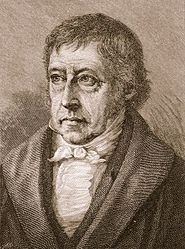
Back موسوعة علوم الفلسفة Arabic Enzyklopädie der philosophischen Wissenschaften German Enciclopedia de las ciencias filosóficas Spanish Filosoofiliste teaduste entsüklopeedia Estonian دائرةالمعارف علوم فلسفی Persian Filosofisten tieteiden ensyklopedia Finnish Encyclopédie des sciences philosophiques French האנציקלופדיה של המדעים הפילוסופיים HE Enciclopedia delle scienze filosofiche in compendio Italian エンチクロペディー Japanese
This article needs additional citations for verification. (May 2016) |
 | |
| Author | Georg Wilhelm Friedrich Hegel |
|---|---|
| Original title | Enzyklopädie der philosophischen Wissenschaften im Grundrisse |
| Language | German |
| Subject | Philosophy |
| Published | 1817 |
| Publication place | Germany |
| Media type | |
 |
| Hegelianism |
|---|
| Forerunners |
| Principal works |
| Schools |
| Related topics |
| Related categories |
The Encyclopaedia of the Philosophical Sciences (abbreviated as EPS or simply Encyclopaedia; German: Enzyklopädie der philosophischen Wissenschaften im Grundrisse, EPW, translated as Encyclopedia of the Philosophical Sciences in Basic Outline) by Georg Wilhelm Friedrich Hegel (first published in 1817, second edition 1827, third edition 1830[1]), is a work that presents an abbreviated version of Hegel's systematic philosophy in its entirety, and is the only form in which Hegel ever published his entire mature philosophical system.[1] The fact that the account is exhaustive, that the grounding structures of reality are ideal, and that the system is closed makes the Encyclopedia a statement par excellence of absolute idealism.
Intended as a pedagogical aid for attendees of his lectures, Hegel revised and extended the Encyclopedia over more than a decade, but stressed its role as a "textbook" in need of elucidation through oral commentary.[2] The 1830 text is widely available in various English translations[3] with copious additions (Zusätze) added posthumously by Hegel's students, deriving from their lecture notes. These additions expand on the text with examples and illustrations, and while scholars do not take the Zusätze to be verbatim transcription of Hegel's lectures, their more informal and non-technical style make them good stand-ins for the "necessary oral commentary".
Part I of the work is sometimes referred to as the Lesser Logic (or Shorter Logic) to distinguish it from the Greater Logic, the moniker given to Hegel's Science of Logic.
- ^ a b Hegel, Georg Wilhelm Fredrich (2010-10-28). "Introduction". In Brinkmann, Klaus; Dahlstrom, Daniel O. (eds.). Georg Wilhelm Friedrich Hegel: Encyclopedia of the Philosophical Sciences in Basic Outline, Part 1, Science of Logic. Cambridge University Press. ISBN 9780521829144.
- ^ Hegel, Georg Wilhelm Fredrich (2010-11-29). Brinkmann, Klaus; Dahlstrom, Daniel O. (eds.). Georg Wilhelm Friedrich Hegel: Encyclopedia of the Philosophical Sciences in Basic Outline, Part 1, Science of Logic. Cambridge University Press. p. 8. ISBN 9780521829144.
- ^ See for example • Hegel, Georg (1991). The encyclopaedia logic, with the Zusätze : Part I of the Encyclopaedia of philosophical sciences with the Zusätze. Indianapolis: Hackett. ISBN 9780872200708., • Hegel, Georg (2004). Hegel's philosophy of nature : being part two of the Encyclopaedia of the philosophical sciences (1830), translated from Nicolin and Pöggeler's edition (1959), and from the Zusätze in Michelet's text (1847. Oxford New York: Clarendon Press Oxford University Press. ISBN 0199272670. • Hegel, Georg (1975). Hegel's Logic : being part one of the Encyclopaedia of the philosophical sciences (1830). Oxford: Clarendon Press. ISBN 0198245122. • Hegel, Georg (2015). Encyclopedia of the philosophical sciences in basic outline. Cambridge: Cambridge University Press. ISBN 1107499690. • Hegel, Georg (1990). Hegel's Philosophy of mind : being part three of the Encyclopaedia of the philosophical sciences (1830). Oxford: Clarendon Press. ISBN 0198750145.
© MMXXIII Rich X Search. We shall prevail. All rights reserved. Rich X Search